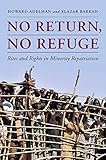No Return, No Refuge : Rites and Rights in Minority Repatriation / Elazar Barkan, Howard Adelman.
Material type: TextPublisher: New York, NY : Columbia University Press, [2011]Copyright date: ©2011Description: 1 online resource (360 p.) : 5 line drawings, 1 tableContent type:
TextPublisher: New York, NY : Columbia University Press, [2011]Copyright date: ©2011Description: 1 online resource (360 p.) : 5 line drawings, 1 tableContent type: - 9780231153362
- 9780231526906
- 325.21 23
- JV6035 .A34 2011
- JV6035 .A34 2015
- online - DeGruyter
- Issued also in print.
| Item type | Current library | Call number | URL | Status | Notes | Barcode | |
|---|---|---|---|---|---|---|---|
 eBook
eBook
|
Biblioteca "Angelicum" Pont. Univ. S.Tommaso d'Aquino Nuvola online | online - DeGruyter (Browse shelf(Opens below)) | Online access | Not for loan (Accesso limitato) | Accesso per gli utenti autorizzati / Access for authorized users | (dgr)9780231526906 |
Browsing Biblioteca "Angelicum" Pont. Univ. S.Tommaso d'Aquino shelves, Shelving location: Nuvola online Close shelf browser (Hides shelf browser)

|

|

|

|

|

|

|
||
| online - DeGruyter Mission Revolution : The U.S. Military and Stability Operations / | online - DeGruyter The Origins of Business, Money, and Markets / | online - DeGruyter Green Innovation in China : China's Wind Power Industry and the Global Transition to a Low-Carbon Economy / | online - DeGruyter No Return, No Refuge : Rites and Rights in Minority Repatriation / | online - DeGruyter The Kitchen as Laboratory : Reflections on the Science of Food and Cooking / | online - DeGruyter Cheese, Pears, and History in a Proverb / | online - DeGruyter Screening Torture : Media Representations of State Terror and Political Domination / |
Frontmatter -- Contents -- Introduction -- [1] The Rites of Rights -- [2] The Right to Expel as an International Norm: 1900-1945 -- [3] Outlawing Ethnic Cleansing -- [4] Reversing Ethnic Cleansing -- [5] Resettling Refugees from Asia -- [6] Force and Repatriation in Africa -- [7] From Jewish Messianism to the Law of Return -- [8] Palestinians and the Right of Return -- [9] Rights and Return -- [10] Ethnic Conflict and Nonreturn -- Notes -- Index
restricted access online access with authorization star
http://purl.org/coar/access_right/c_16ec
Refugee displacement is a global phenomenon that has uprooted millions of individuals over the past century. In the 1980s, repatriation became the preferred option for resolving the refugee crisis. As human rights achieved global eminence, refugees' right of return fell under its umbrella. Yet return as a right and its practice as a rite created a radical disconnect between principle and everyday practice, and the repatriation of refugees and Internally Displaced Persons (IDPs) remains elusive in cases of forced displacement of victims by ethnic conflict.Reviewing cases of ethnic displacement throughout the twentieth century in Europe, Asia, and Africa, Howard Adelman and Elazar Barkan juxtapose the empirical lack of repatriation in cases of ethnic conflict, unless accompanied by coercion. The emphasis on repatriation during the last several decades has obscured other options, leaving refugees to spend years warehoused in camps. Repatriation takes place when identity, defined by ethnicity or religion, is not at the center of the displacing conflict, or when the ethnic group to which the refugees belong are not a minority in their original country or in the region to which they want to return. Rather than perpetuate a ritual belief in return as a right without the prospect of realization, Adelman and Barkan call for solutions that bracket return as a primary focus in cases of ethnic conflict.
Issued also in print.
Mode of access: Internet via World Wide Web.
In English.
Description based on online resource; title from PDF title page (publisher's Web site, viewed 02. Mrz 2022)


